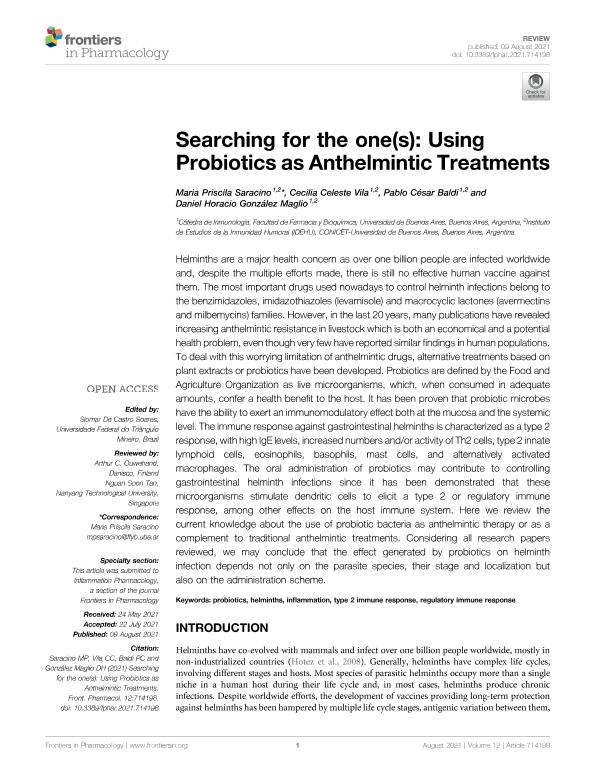Mostrar el registro sencillo del ítem
dc.contributor.author
Saracino, María Priscila

dc.contributor.author
Vila, Cecilia Celeste

dc.contributor.author
Baldi, Pablo Cesar

dc.contributor.author
Gonzalez Maglio, Daniel Horacio

dc.date.available
2022-12-21T12:55:32Z
dc.date.issued
2021-08
dc.identifier.citation
Saracino, María Priscila; Vila, Cecilia Celeste; Baldi, Pablo Cesar; Gonzalez Maglio, Daniel Horacio; Searching for the one(s): Using Probiotics as Anthelmintic Treatments; Frontiers Media; Frontiers in Pharmacology; 12; 8-2021; 1-13
dc.identifier.uri
http://hdl.handle.net/11336/181925
dc.description.abstract
Helminths are a major health concern as over one billion people are infected worldwide and, despite the multiple efforts made, there is still no effective human vaccine against them. The most important drugs used nowadays to control helminth infections belong to the benzimidazoles, imidazothiazoles (levamisole) and macrocyclic lactones (avermectins and milbemycins) families. However, in the last 20 years, many publications have revealed increasing anthelmintic resistance in livestock which is both an economical and a potential health problem, even though very few have reported similar findings in human populations. To deal with this worrying limitation of anthelmintic drugs, alternative treatments based on plant extracts or probiotics have been developed. Probiotics are defined by the Food and Agriculture Organization as live microorganisms, which, when consumed in adequate amounts, confer a health benefit to the host. It has been proven that probiotic microbes have the ability to exert an immunomodulatory effect both at the mucosa and the systemic level. The immune response against gastrointestinal helminths is characterized as a type 2 response, with high IgE levels, increased numbers and/or activity of Th2 cells, type 2 innate lymphoid cells, eosinophils, basophils, mast cells, and alternatively activated macrophages. The oral administration of probiotics may contribute to controlling gastrointestinal helminth infections since it has been demonstrated that these microorganisms stimulate dendritic cells to elicit a type 2 or regulatory immune response, among other effects on the host immune system. Here we review the current knowledge about the use of probiotic bacteria as anthelmintic therapy or as a complement to traditional anthelmintic treatments. Considering all research papers reviewed, we may conclude that the effect generated by probiotics on helminth infection depends not only on the parasite species, their stage and localization but also on the administration scheme.
dc.format
application/pdf
dc.language.iso
eng
dc.publisher
Frontiers Media

dc.rights
info:eu-repo/semantics/openAccess
dc.rights.uri
https://creativecommons.org/licenses/by/2.5/ar/
dc.subject
HELMINTHS
dc.subject
INFLAMMATION
dc.subject
PROBIOTICS
dc.subject
REGULATORY IMMUNE RESPONSE
dc.subject
TYPE 2 IMMUNE RESPONSE
dc.subject.classification
Inmunología

dc.subject.classification
Medicina Básica

dc.subject.classification
CIENCIAS MÉDICAS Y DE LA SALUD

dc.title
Searching for the one(s): Using Probiotics as Anthelmintic Treatments
dc.type
info:eu-repo/semantics/article
dc.type
info:ar-repo/semantics/artículo
dc.type
info:eu-repo/semantics/publishedVersion
dc.date.updated
2022-10-17T13:15:08Z
dc.identifier.eissn
1663-9812
dc.journal.volume
12
dc.journal.pagination
1-13
dc.journal.pais
Suiza

dc.journal.ciudad
Lausana
dc.description.fil
Fil: Saracino, María Priscila. Consejo Nacional de Investigaciones Científicas y Técnicas. Oficina de Coordinación Administrativa Houssay. Instituto de Estudios de la Inmunidad Humoral Prof. Ricardo A. Margni. Universidad de Buenos Aires. Facultad de Farmacia y Bioquímica. Instituto de Estudios de la Inmunidad Humoral Prof. Ricardo A. Margni; Argentina. Universidad de Buenos Aires. Facultad de Farmacia y Bioquímica. Departamento de Microbiología, Inmunología y Biotecnología. Cátedra de Inmunología; Argentina
dc.description.fil
Fil: Vila, Cecilia Celeste. Consejo Nacional de Investigaciones Científicas y Técnicas. Oficina de Coordinación Administrativa Houssay. Instituto de Estudios de la Inmunidad Humoral Prof. Ricardo A. Margni. Universidad de Buenos Aires. Facultad de Farmacia y Bioquímica. Instituto de Estudios de la Inmunidad Humoral Prof. Ricardo A. Margni; Argentina. Universidad de Buenos Aires. Facultad de Farmacia y Bioquímica. Departamento de Microbiología, Inmunología y Biotecnología. Cátedra de Inmunología; Argentina
dc.description.fil
Fil: Baldi, Pablo Cesar. Consejo Nacional de Investigaciones Científicas y Técnicas. Oficina de Coordinación Administrativa Houssay. Instituto de Estudios de la Inmunidad Humoral Prof. Ricardo A. Margni. Universidad de Buenos Aires. Facultad de Farmacia y Bioquímica. Instituto de Estudios de la Inmunidad Humoral Prof. Ricardo A. Margni; Argentina. Universidad de Buenos Aires. Facultad de Farmacia y Bioquímica. Departamento de Microbiología, Inmunología y Biotecnología. Cátedra de Inmunología; Argentina
dc.description.fil
Fil: Gonzalez Maglio, Daniel Horacio. Consejo Nacional de Investigaciones Científicas y Técnicas. Oficina de Coordinación Administrativa Houssay. Instituto de Estudios de la Inmunidad Humoral Prof. Ricardo A. Margni. Universidad de Buenos Aires. Facultad de Farmacia y Bioquímica. Instituto de Estudios de la Inmunidad Humoral Prof. Ricardo A. Margni; Argentina. Universidad de Buenos Aires. Facultad de Farmacia y Bioquímica. Departamento de Microbiología, Inmunología y Biotecnología. Cátedra de Inmunología; Argentina
dc.journal.title
Frontiers in Pharmacology
dc.relation.alternativeid
info:eu-repo/semantics/altIdentifier/url/https://www.frontiersin.org/articles/10.3389/fphar.2021.714198/full
dc.relation.alternativeid
info:eu-repo/semantics/altIdentifier/doi/http://dx.doi.org/10.3389/fphar.2021.714198
Archivos asociados
